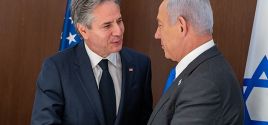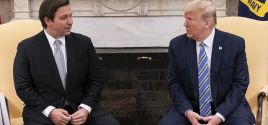Anti-war Democrat has ties to U.S.' prewar Iraq claimsFreshman lawmaker worked for Pentagon unit touting al-Qaida linkBy GREG MILLER Los Angeles Times Nov. 28, 2006 |
Popular 
'We Own This Country': Mark Levin Says Pro-Palestine Protesters Should be 'Rounded Up and Deported'

Zionist Mob Attacks Pro-Palestine Protesters at UCLA While Screaming 'Second Nakba'

Israel-Ukraine $95B Aid Bill Includes Provision to 'Supercharge Mass Migration From the Middle East'

Trump Meets With DeSantis in 'Quest for Donors,' Calls for Protests to be Shut Down One Day Later

"I've Never Seen This Many Police": NYPD Launch Crackdown on Pro-Palestine Protesters at Columbia
 WASHINGTON — Of all the Democrats who rode a wave of public anger about Iraq to election victories this month, Chris Carney had the most unlikely credentials as a war critic. Before winning the race for Pennsylvania's 10th Congressional District, Carney was part of an intelligence unit at the Pentagon that was responsible for some of the most alarming — and, it turned out, unfounded — prewar claims about Iraq. Assigned to search for links between Iraq and al-Qaida, the unit reached a series of conclusions, including that a Sept. 11 hijacker had met with an Iraqi agent in Prague, that since have been widely discredited. The Pentagon unit was created and run by one of the Iraq war's principal architects, then-Undersecretary of Defense Douglas Feith. Carney took part in briefings at the White House and the Pentagon that disparaged the CIA for underestimating the relationship between Baghdad and the terrorist network. Vice President Dick Cheney and other administration officials frequently touted the findings to bolster the case for war. Despite his background, Carney campaigned as an anti-war Democrat and said he got a "very warm reception" when he arrived at Capitol Hill this week to take part in orientation activities for incoming members. Carney is a lifelong Democrat, according to his press secretary. "They are intrigued," Carney said of his fellow freshmen. "But I'm not sure all of them know about this." Not apologeticCarney's election underscores the conservative leanings of some of the newly arriving Democrats who have given their party control of both chambers of Congress for the first time in more than a decade. Rep. Anna Eshoo, D-Calif., said she was disturbed by the work that came out of Feith's office but doubted that members would hold that against Carney. Eshoo said she met Carney this week, and "he seems really lovely." "I think that in retrospect that what happened there is deeply troubling, and we're paying a price for it," Eshoo said. "But I don't want to cast judgment on him." Carney, 47, is not apologetic about his work for Feith's unit at the Pentagon. "I certainly stand by the fact that I believe there was some sort of relationship," he said in an interview. "On a scale from zero to 10, with zero being no relationship and 10 perfect operational coordination," Carney said, the Iraq-al-Qaida link was "somewhere in the 2.5 range." That appears to be a more qualified assessment than the so-called Counterterrorism Evaluation Group presented to policymakers during a series of briefings in 2002. In one briefing slide, the group asserted that there was "more than a decade of numerous contacts" between Iraq and al-Qaida, and that there were "multiple areas of cooperation," possibly including the Sept. 11 attacks. Didn't expect to win raceCarney, a reserve officer in the U.S. Navy and political science professor at Pennsylvania State University, wasn't expected to win his conservative-leaning district in eastern Pennsylvania. But his chances improved when the Republican incumbent, Don Sherwood, admitted he had a five-year extramarital affair and later denied accusations that he had choked his mistress. Carney said he was initially a supporter of the invasion of Iraq but has been dismayed by the handling of the postwar insurgency. His stance hardened, he said, when one of his college students returned from Iraq and complained of how ill-equipped U.S. fighting units were. "They had to scrounge Iraqi scrap yards for junk metal to weld onto their trucks," Carney said. "You cannot be supportive of that sort of thing." Carney defends his work for Feith's unit by saying that many postwar conclusions are based on information not available to analysts in 2002. Polls show a significant minority of Americans still think Iraq was somehow involved in the Sept. 11 attacks, but Carney disputes that his work contributed to that misperception or pushed the United States into war. "I was one voice among hundreds talking about this," Carney said. "Ultimately, the decision to go to war rests with the president, and I am certain that the president had lots of information other than what I had." Carney said much of his focus as a member of Congress will be on domestic issues, including health care and job security. Still, he said he thinks U.S. intelligence agencies suffer from a lack of creative thinking, and that he has ideas about how to fix some of the problems. "There are a number of things I'm looking at as committee assignments, and the Intelligence Committee is certainly one of them," he said. If selected, he added, "I think I would apply the same kind of rigor to those issues that we did in the Pentagon." |



